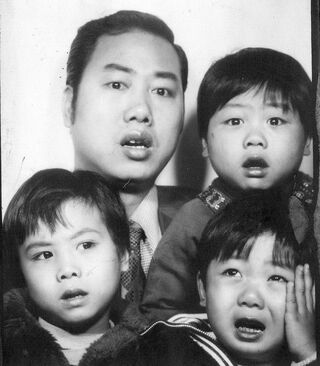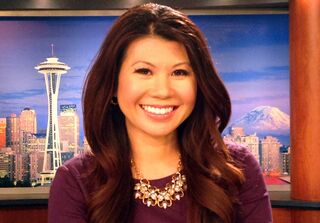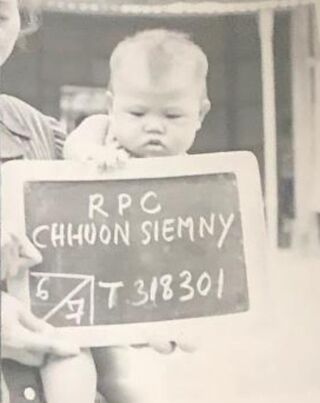Self-Harm
The Name Change of Asian Immigrants
Why Asians "Americanize" their names.
Posted March 29, 2021 Reviewed by Abigail Fagan

As first-generation Chinese immigrants from Hong Kong, my parents shared a funny story of how my brothers and I acquired our “American” names. When we arrived in Seattle as toddlers, my parents went to the one white couple they knew and asked them what would be nice names for us here in the U.S.
Without much hesitation, they responded, “Let’s go with Sam, Ken, and Fred!” So in the blink of an eye, our Chinese names were replaced with Sam, Ken, and Fred. We didn’t have any say in the matter as our parents thought this would be the best way to help us assimilate easier into this country.
This was common practice among many of the Asian students I grew up with. Changing their ethnic name was a gesture of our willingness to adopt and adapt to American norms.
There were those who kept their ethnic names but it came with risk—the risk of being teased by other kids for being different.
In adulthood, the pain of our Asian heritage was made more evident in the professional world. For example, I heard colleagues in broadcasting would change their names so it was more palatable to mainstream audiences.

One such example is from a prominent television anchor in my hometown of Seattle. Siemny Kim works for the CBS affiliate but her real name is Siemny Chhuon. In her case, she wanted to keep her ethnic name but was told by the boss who hired her that she had to change her last name to Kim as he thought her Cambodian last name of Chhuon wouldn’t work for an anchor.
Kim recently discussed this ordeal and gave me permission to include it in this post:
I’ve been processing what’s happened to the Asian American community across the country. I’m sad. I’m angry. I’m upset. But, to denounce the horrific violence facing the community, I also have to address the issue of discrimination—where it all begins—that, when left unchecked, can escalate into extreme violence. And I also must admit that I’ve been complicit.

In 2015, I moved to Seattle to work at KIRO 7. But here’s what many of you don’t know. For my entire career before Seattle, I used my maiden name—Siemny Chhuon. But the news director at the time said I’d have to change my name because it would be too difficult for a Monday-Friday anchor. No name change, no job. I struggled. To change it after more than 10 years in the business was strange. It’s the name I had when I came to this country, the name I kept when I was naturalized as a US citizen, and the name I never once hesitated to use when starting off in the business. It’s also identifiably Cambodian which makes me very proud. To change it, felt like I would be denying my heritage.
But you know how this story ends. I landed on Kim because it’s my father’s first name and I convinced myself it was still a way to pay tribute to him, to my family. But I felt uncomfortable because as identifiable as Chhuon is Khmer, I knew that I was taking on a name that is distinctly Korean. In my inner circles, I’d even joke that I played a Korean woman on TV.
Deep down, I knew that this incident is just as Anti-Asian as the kids on the playground who refuse to learn or make fun of your name. The only difference is those same kids have grown up and can make powerful decisions about your future—who works and who doesn’t. Be Asian to check off the diversity box but don’t be too Asian or the wrong kind of Asian. It was the beginning of a job where I’d already compromised myself and when that boss abruptly demoted me to weekend mornings—suddenly, I was stuck with this name, and the reason I changed it gone.
I struggled to share this because as much as I fight for other people’s voices to be heard, I’ve been long used to having mine silenced. I’ve bit my tongue to appease people for much too long. I also struggled to share this because if I had not agreed to change my name on-air, I wouldn’t have come and grown my beautiful family here. To speak out against it, it would appear that I’m speaking out against the trajectory of my life. And that couldn’t be further from the truth. I want my kids to be proud of who they are. I want them to stand up for themselves. We are not a monolith.
Historically, being forced to change one's name is about power and control. Think about the slaves from Africa who were stripped of all their rights, including the right to keep their names. If you've ever seen the TV series Roots, there's a reminder of how much a name meant when Kunta Kinte's character refused to accept the name Toby, given to him by his slavemasters. He eventually does so but he also fiercely preserves it by reminding his descendants of his real name along with the associated meaning, heritage, and pride which came with his African name.
Due to the oppression of slavery and beyond, I can see why some African-Americans have more ethnic names. I appreciate their desire to find a means to reconnect with their heritage. When you have to disown a major aspect of your identity such as your name as a means to fit into American society, it can feel like you're cutting off a part of yourself to the world. How is it that we are asked to sacrifice so much to be accepted in this country? In a country that presumably extols the virtues of diversity, yet at the same time shuns those who appear or sound too ethnic?
For myself, I haven't thought about reclaiming my Chinese name per se, but what I can do is renounce the need to cater to what mainstream America wants of me. I can stand proud to be an Asian-American, an American with a past rooted in a heritage that's different from the first European settlers.




